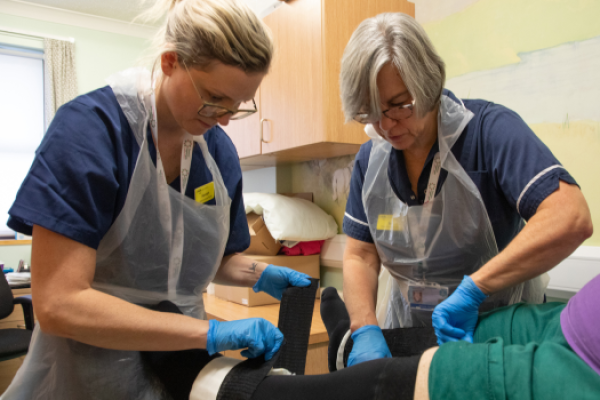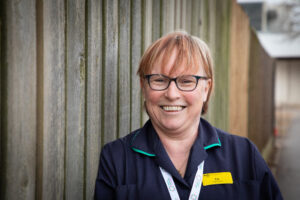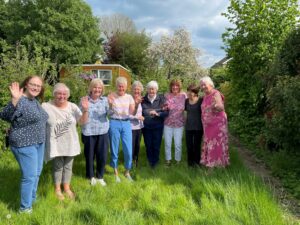On World Lymphoedema Day on 6th March, Sue Lawrance urges prompt action to deal with lymphoedema.
Sue is the Lymphoedema Clinical Nurse Specialist at Florence Nightingale Hospice.
World Lymphoedema Day raises awareness of this condition which affects 450,000 people of all ages across the UK. Lymphoedema occurs when the lymphatic drainage system fails to work effectively and causes swellings or lymphoedema.
Sue points to a recent case, a man in his 50s, who had lived with swelling below his knees for the last five years. This hadn’t been properly managed and the man had significant skin problems including thick plaques on the backs of his legs and very restricted mobility. He was referred to Florence Nightingale Hospice’s Lymphoedema Clinic and, in just two weeks, the team reduced the circumference of his legs by 20cm.
This man is now back at work, able to drive his car, walk his dog and fit into his clothes and shoes. His quality of life has dramatically improved following daily visits to the Clinic for two weeks. Much of this is due to compression therapy, which uses specialist bandages or garments such as stockings. This therapy puts pressure on tissues to stop fluid build-up and encourages trapped lymphatic fluid to drain.
It’s a similar story for many of the cancer patients who Sue sees at the Clinic, such as the teacher in her 30s recovering from breast cancer, unable to use her computer because her hand was so swollen. Following a course of treatment of manual lymph drainage, (a light, skin-stretching massage that helps move the lymphatic fluid out of the swollen hand) and compression bandaging, the teacher returned to work. However, as with all lymphoedema patients, it’s vital that she learns to manage the condition herself. Massage, compression, exercise and good skin care are all important.
The Lymphoedema Clinic at Florence Nightingale Hospice is run by Sue, supported by Hannah (Lymphoedema Practitioner) and Sandi (Manual Lymphatic Drainage specialist) and supported by volunteer Cathy who is a specialist Physiotherapist. It is totally funded by Florence Nightingale Hospice Charity and outpatient clinics are held Monday to Friday.
Sue has worked for 26 years at the Hospice, beginning her career at the John Radcliffe Hospital in Oxford. She became interested in lymphoedema care after completing her District Nursing training. Funding for a community lymphoedema service in North London was obtained from Queen’s Nursing Institute after Sue and her colleague won the Innovative Project award.
“Chronic swelling really impacts quality of life,” says Sue. “However effective management of lymphoedema reduces swelling, improves mobility and function and improves patients’ lives.”
Many patients have suffered from cancer, as surgery or treatment can remove areas where there are a lot of lymph nodes, but there are many causes of this condition. If the lymphatic system is not properly formed, is damaged or we are not moving around enough it will not filter fluid properly and a build-up occurs in the tissues leading to swelling.
Lymphoedema may be Primary (due to a genetic problem), or Secondary due to damage to lymphatic systems, most commonly associated with cancer treatments.
Sue stresses that patients have to fully engage with treatment, learn how to use compression techniques or massage themselves to keep the condition under control.
Exercise and skin care are also important as lymphoedema is a lifelong condition. However, following treatment, the majority of Sue’s patients are successful at managing lymphoedema and improving their lives.
Lymphoedema Clinic information at Florence Nightingale Hospice
Further information can be found at Lymphoedema Support Network https://www.lymphoedema.org and at https://lymphoedemaunited.com/








